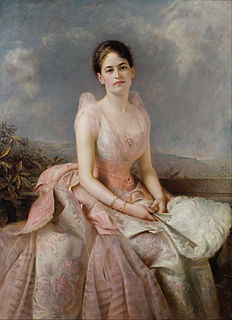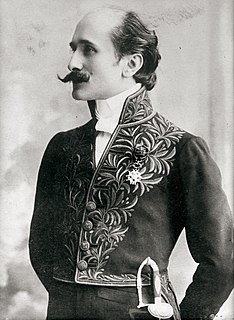A Quote by Henry James
She had her own way of doing all that she did, and this is the simplest description of a character which, although by no means without liberal motions, rarely succeeded in giving an impression of suavity.
Related Quotes
The doctor's wife wasn't a bad woman. She was sufficiently convinced of her own importance to believe that God actually did watch everything she did and listen to everything she said, and she was too taken up with rooting out the pride she was prone to feeling in her own holiness to notice any other failings she might have had. She was a do-gooder, which means that all the ill she did, she did without realizing it.
Outward objects cannot take hold of the soul, nor force their passage into her, nor set any of her wheels going. No, the impression comes from herself, and it is her own motions which affect her. As for the contingencies of fortune, they are either great or little, according to the opinion she has of her own strength.
Marilyn Monro wasn't the brightest person in the world - that didn't make a difference one way or the other - but she was giving and kind. And that's what got her in trouble. She was so giving and kind to all of these people she met that she found herself doing these things that she didn't want to do.
The universal nature has no external space; but the wondrous part of her art is that though she has circumscribed herself, everything which is within her which appears to decay and to grow old and to be useless she changes into herself, and again makes other new things from these very same, so that she requires neither substance from without nor wants a place into which she may cast that which decays. She is content then with her own space, and her own matter, and her own art.
I never did, nor do I believe I ever shall, give advice to a woman who is setting out on a matrimonial voyage; first, because I never could advise one to marry without her own consent; and, secondly, I know it is to no purpose to advise her to refrain when she has obtained it. A woman very rarely asks an opinion or requires advice on such an occasion, till her resolution is formed; and then it is with the hope and expectation of obtaining a sanction, not that she means to be governed by your disapprobation, that she applies.
You cannot hammer a girl into anything. She grows as a flower does, she will wither without sun; she will decay in her sheath as a narcissus will if you do not give her air enough; she might fall and defile her head in dust if you leave her without help at some moments in her life; but you cannot fetter her; she must take her own fair form and way if she take any.
HONOR. This means that a girl is not satisfied with keeping the letter of the law when she really breaks it in spirit.
LOYAL. This means that she is true to her country, to the city or village where she is a citizen, to her family, her church, her school, and those for whom she may work or who may work for her.
HELPFUL. The simplest way of saying this for the very young Scout is to do a good turn to someone every day: that is, to be a giver and not a taker. This is the spirit that makes the older Scout into a fine, useful, dependable woman.
Tessa had begun to tremble. This is what she had always wanted someone to say. What she had always, in the darkest corner of her heart, wanted Will to say. Will, the boy who loved the same books she did, the same poetry she did, who made her laugh even when she was furious. And here he was standing in front of her, telling her he loved the words of her heart, the shape of her soul. Telling her something she had never imagined anyone would ever tell her. Telling her something she would never be told again, not in this way. And not by him. And it did not matter. "It's too late", she said.
From the first time he'd met her, he'd sensed an air of contradiction about her. She was very much a woman, but still retained a waiflike quality. She could be brash, and at times deliberately suggestive, yet she was painfully shy. She was incredibly easy to get along with, yet she had few friends. She was a talented artist in her own right, but so self-conscious about her work that she rarely completed a piece and preferred to work with other people's art and ideas.
She smiled. She knew she was dying. But it did not matter any longer. She had known something which no human words could ever tell and she knew it now. She had been awaiting it and she felt it, as if it had been, as if she had lived it. Life had been, if only because she had known it could be, and she felt it now as a hymn without sound, deep under the little whole that dripped red drops into the snow, deeper than that from which the red drops came. A moment or an eternity- did it matter? Life, undefeated, existed and could exist. She smiled, her last smile, to so much that had been possible.
She is a mortal danger without meaning to be one; she's exquisite without giving ita thought; shes a trap set by nature, a rose in which love lies in ambush! Anyone who has seen her smile has known perfection. She creates grace without movement and makes all divinity fit into her slightest gesture. And neither Venus in her shell, nor Diana striding in the great, blossoming forest, can compare to her when she goes through the streets of paris in her sedan chair.
although she went home that night feeling happier than she had ever been in her short life, she did not confuse the golf course party with a good party, and she did not tell herself she had a pleasant time. it had been, she felt, a dumb event preceded by excellent invitations. what frankie did that was unusual was to imagine herself in control. the drinks, the clothes, the instructions, the food (there had been none), the location, everything. she asked herself: if i were in charge, how could i have done it better?
That was a general impression that one got, that she [Eleanor Roosevelt] was always flitting around the country and descending on some place in the Ozarks that she decided was disadvantaged, and announcing that something had to be done. And she had a very active social conscience, which I think in general is to her credit, although it tended, as many people thought, to just be overdone to the point where it gave rise to this crack that she regarded the whole world as one vast slum project






































